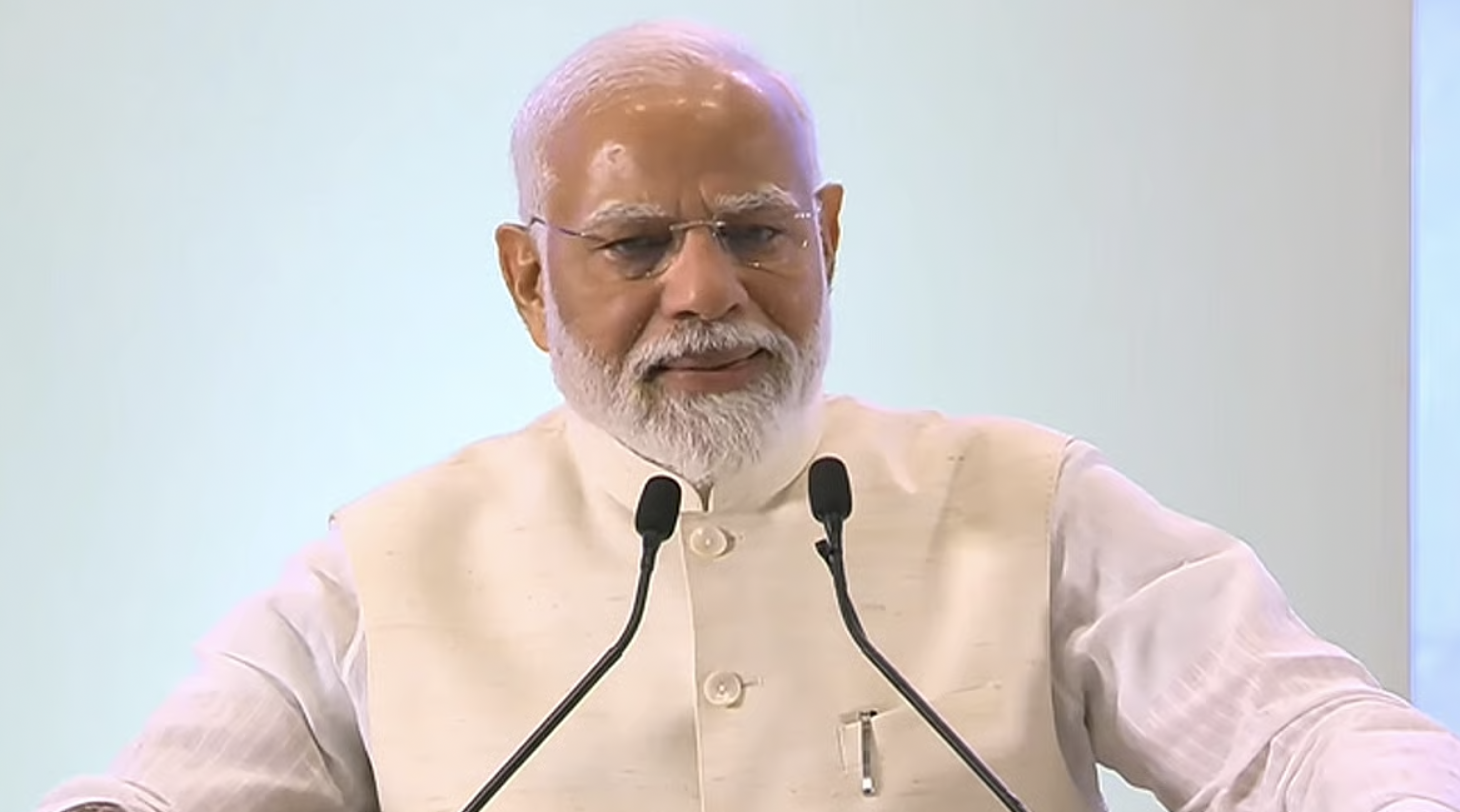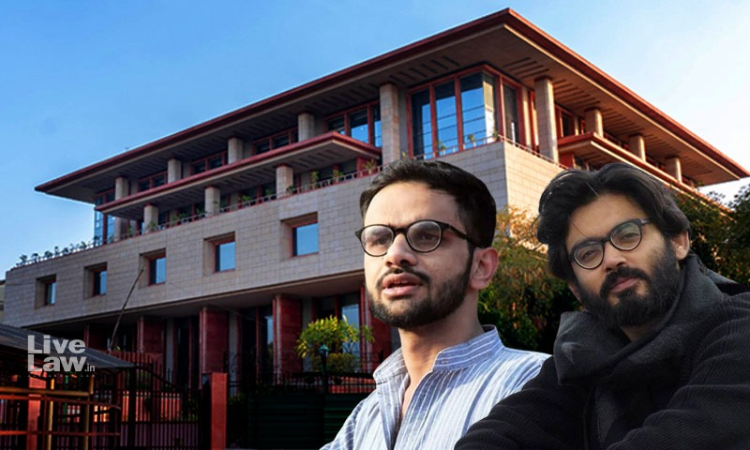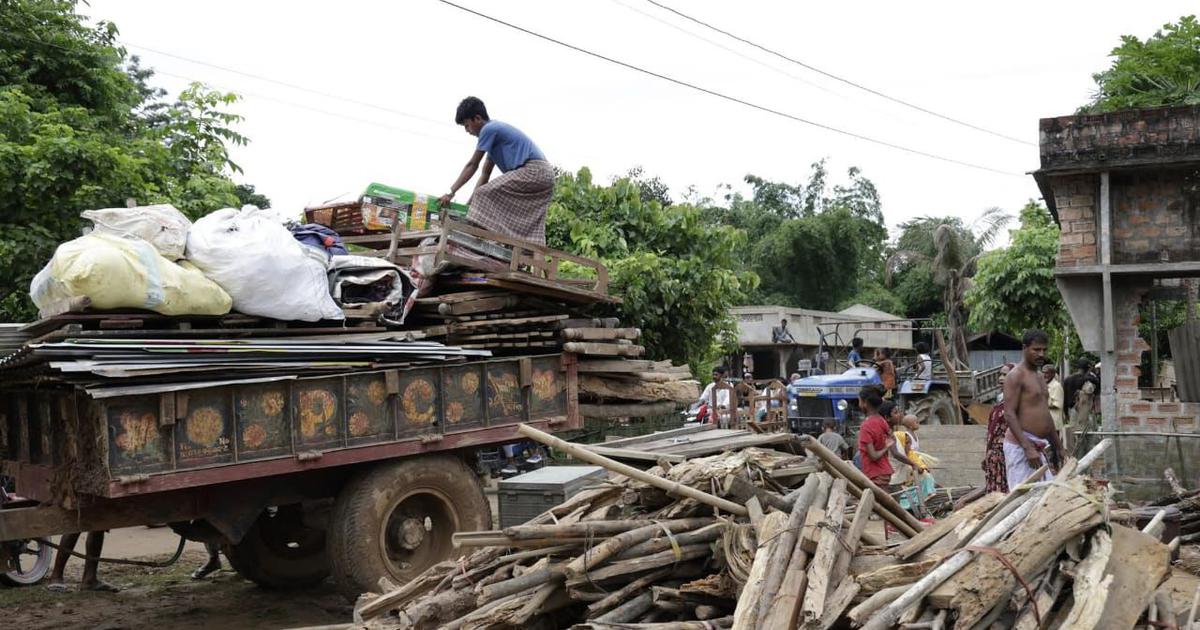When the next phase of the grand Swaminarayan Akshardham temple in Robbinsville, N.J. is completed this summer, it will become the biggest Hindu temple in the Western Hemisphere. The temple is set on 220 scenic acres not far from New York City. It includes intricately carved wood pillars and arches designed with 17th-century Indian Haveli architecture. Visitors are greeted by a 49-foot-tall bronze idol of Swaminarayan surrounded by pools of water and decorative gardens. The $150 million project reflects the wealth, influence and growing political power of the Hindu American community.
The next phase will likely be inaugurated by Indian Prime Minister Narendra Modi himself, in August 2023. Modi did something similar in December 2022 when he inaugurated the centenary celebrations at the Akshardham temple in India. Followers of Swaminarayan tend to be the Gujaratis— people from Gujarat state in western India. Gujaratis have traditionally been the biggest and richest business community in India, and one of the highest sub-communities among Hindu migrants in the United States.
The Swaminarayan sect, known as BAPS, has several followers who are influential in business and social circles. However, the temple has not always been free of controversy and is currently struggling with a scandal involving workers from India brought to the U.S. to build the temple. Among these laborers, many are Dalits, identified as belonging to the lowest rung in the Indian caste system.
The Federal Bureau of Investigation raided the temple grounds in 2021 after complaints of human trafficking. A lawsuit is filed against the management of Swaminarayan Akshardham temple — the Bochasanwasi Akshar Purushottam Swaminarayan Sanstha, known as BAPS. The lawsuit alleges that BAPS lured workers from India to build the world-class project, made them work nearly 90 hours per week, and under paid them. A criminal investigation by the U.S. Attorney’s office is underway. While in September 2022, a 57-year-old man was killed on the construction site at the temple, police said a “construction accident occurred” but did not release any additional details.
New Jersey, a comparatively smaller state, has the third highest concentration of Hindu population in the U.S., after New York and California. In September 2021, New Jersey aligned with the World Hindu Council and declared October as Hindu Heritage Month. In the U.S. nationwide, there are roughly 4.2 million Indian Americans and among them more than 50 percent are Hindus. Indian festivals and other cultural events are increasingly being given prominence by political leaders.
Indian Americans are also among the highest donors to the political parties. As per the Federal Election Commission data, a Hindu Indian American businessman, Shalabh Kumar, a staunch Republican Party supporter to date has contributed $2,187,994 alone. He was also the top individual donor for Trump’s Victory during the 2016 elections having spent $898,800. Indian Americans also contributed nearly $10 million to the Democrats. During the 2020 elections, at a single fundraising event, the Biden Victory Fund raised a record-breaking $3.3 million from the community.
Along with leading top management in information and technology companies, academics, and fields of science and commerce, the community is rapidly reaching top leadership in U.S. politics and administration. In 2020, Kamala Harris, became the first Indian-origin American as well as the first woman in American history to be the Vice President. On the Republican side, Nikki Haley recently announced her candidacy for the Republican nomination for president. A former U.S. ambassador to the United Nations and former governor of South Carolina, Haley highlighted her Indian heritage in her announcement video.
In February, President Joe Biden nominated Ajay Banga as President of the World Bank. An Indian American, and former CEO of Mastercard, Banga has worked closely with Vice President Harris as the Co-Chair of the Partnership for Central America, a press release from the White House said. In October 2022, Hindu American, Chandru Acharya was appointed to the Department of Homeland Security’s Faith-based Security Advisory Council.
But there is also a dark side to the rise of Hindu influence in the U.S.: a strong streak of Hindu nationalism.
Indian Americans, especially Hindus have demonstrated a strong alignment with the far-right-wing Hindu nationalist Bhartiya Janata Party (BJP) in India. BJP is the political party under the umbrella of Rashtriya Swayamsevak Sangh (RSS), an organization that promotes Hindutva — an extremist movement that believes in global Hindu supremacy. Hindutva comes with a majoritarian political ideology and extremist claims of the racial and cultural dominance of Hindus over all other races, especially Muslims.
As the Hindutva movement is at its peak in India, so has it risen in the Indian diaspora in the United States. A 2022 Oxford research paper titled “Hindutva in Indian American Diaspora” states: “Hindu Indians living in the U.S have contributed greatly to the rise of Hindutva both materially and morally. In its ‘soft’ version, American Hindutva highlights the universalism and tolerance of Hinduism. In its ‘hard’ version, it provides moral and financial support for the political activities, including violence against minorities and the election of Hindu nationalist leaders.”
Activists and scholars trying to issue warnings about the consequences of the extremism say that they have been pretty much crushed, criticized as anti-Hindus, and lawsuits filed against them by pro-Hindu groups. In September 2021, some 50 top universities in the U.S.—including Harvard, Stanford, Princeton, Rutgers, and NYU — co-sponsored an online conference on “Dismantling Global Hindutva.” The organizers insisted that the objective was to discuss Hindu extremism, the oppression of Muslims, and the effects of these trends in India and the U.S.
“Hindu Indians living in the U.S have contributed greatly to the rise of Hindutva both materially and morally. In its ‘soft’ version, American Hindutva highlights the universalism and tolerance of Hinduism. In its ‘hard’ version, it provides moral and financial support for the political activities, including violence against minorities and the election of Hindu nationalist leaders.”
The conference however got massive backlash from Hindu groups in America and charged that the event was Hinduphobic. The Hindu American Foundation (HAF) came ahead with its official stand over the conference on social media and its website saying, “The Dismantling Global Hindutva conference is intentionally Hinduphobic. In working to “dismantle” rather than understanding an imagined global threat of political, “supremacist” Hindus, these activists and activist-scholars hide behind supposed academic freedom to fear-monger and dehumanize Hindus around the world.”
The speakers faced harassment, threats, and intimidating messages. While, the Vishwa Hindu Parishad of America (VHPA), the Coalition of Hindus in North America, and the HAF claimed that they collectively sent more than 1.3 million emails to dozens of universities to withdraw their support for the conference. HAF had also issued an email action alert, calling on the non-resident Indians to write letters to India’s foreign ministry to persuade the cosponsoring universities to reconsider their association with the conference.
The conference was held, and the organizers claimed the event got 33,000 total views and that 44 speakers participated. Some of the speakers included filmmaker Anand Patwardhan, political scientist Christophe Jaffrelot, activist Meena Kandasamy, and Indian Dalit-feminist writer P. Sivakam among others. But it is questionable how successful it was and whether it achieved its objective of bringing the subject of global Hindutva into public discourse. The pro-Hindu groups continue to claim that the conference was arranged by anti-Hindus to defame the religion.
HAF executive director Suhag Shukla in a series of Tweets said, “They said they want to Dismantle Hindutva. We warned that they meant Hinduism. Your names were used to platform hate,” she wrote, tagging a few universities who were co-sponsors. Physician Rajiv Pandit, who is on the board of directors for the HAF accused the conference organizers of distorting statements given by co-sponsoring universities, citing the example of Sandford University.
The scholars had decided to organize the conference after a defamation lawsuit was filed against five activists by HAF. The foundation’s lawsuit, filed in May 2021 claimed that several scholars and activists had conspired to defame the Hindu group in two different articles published in Al Jazeera in April 2021. Among those named in the lawsuit were Rutgers University professor Audrey Truschke, Hindus for Human Rights co-founders Sunita Vishwanath and Raju Rajagopal, Indian American Muslim Council executive director Rasheed Ahmed and Federation of Indian American Christian Organizations of North America chairman John Prabhudoss.
The Al Jazeera articles spotlighted that five Hindu American organizations, including the Hindu American Foundation, had received COVID-19 relief funds from the U.S government amounting to $833,000. It mentioned that these outfits have ties to Hindu supremacists and religious groups in India. They argued that the huge amount of funds allotted to these organizations should raise concerns over its misuse for the Hindutva agenda rather than COVID relief.
The defamation lawsuit however was dismissed by the U.S. Court for the District of Columbia in December 2022. The judgment noted that the court cannot plausibly infer that any of the defendant’s statements were made with actual malice.” While others were quoted in the articles, Truschke had posted the articles on Twitter.
Truschke, an author and professor of South Asian studies, said that she is more of a soft target for Hindu extremists than the other Indian American activists because she is white and a woman. During the “Dismantling Global Hindutva” conference, Truschke said that she was not on the organizing committee of the conference, but still faced harassment and received threatening emails from the protestors. She however was promoting the conference and actively tweeting about it. The pro-Hindu groups claimed that Truschke was the main organizer for the conference, who believes in anti-Hindu propaganda.
In March 2023, The Georgia Assembly passed a resolution condemning Hinduphobia and anti-Hindu bigotry, making it the first American State to take such a legislative measure. The resolution mentions, “In July 2022, a report released by Rutgers University titled ‘Anti-Hindu Disinformation,’ detailed how hate messages on social media translate into real life threats for the people of Hindus, and Hinduphobia is exacerbated and institutionalized by some academia who support the dismantling of Hinduism.” The pro-Hindu groups celebrated this resolution. The Coalition of Hindus in North America posted its response on Twitter criticizing Truschke further, calling her a pathological liar and underlining to Rutgers University to think if she represents their standards of academic freedom and judgment.
Historian and author Shridhar Damle said, “Over decades, the Hindu organizations in the U.S. have been promoting Hindu nationalism. But the movement accelerated after BJP came into power in India in 2014 and Narendra Modi, a Hindu nationalist leader became the prime minister.” Damle in his book “Messengers of Hindu Nationalism” writes that, “No Indian leader before Modi gave importance to connect national pride to Indians overseas. His campaign and BJP’s manifesto of the 2014 Indian national elections reflected the central theme of interests of Indian professionals working abroad and articulate the Brand India globally. Even as chief minister of Gujarat state before 2014, his speeches were touted with overseas goals.”
Under the Modi government, India has been witnessing several pro-Hindu and anti-Muslim activities. To his critics, Modi is an authoritarian leader and has an image of a strongman who can take over anyone or any organization, especially when it comes to Hinduism and national pride…
This story was originally published in americankahani.com. Read the full story here






